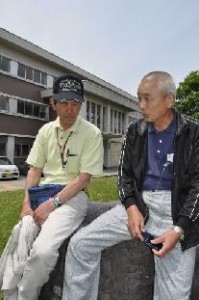Fukushima and Hiroshima: Accounts of 50 local residents, Part 2 [2]
Jun. 29, 2011
Article 2: Frustration felt by local governments
by Seiji Shitakubo and Yo Kono, Staff Writers
Information conveyed too late
“Is this being broadcast live or is it videotaped?” shouted Kazumasa Komatsu, 42, a civil servant of the town of Hirono in Fukushima Prefecture, a spontaneous remark in front of the television set. On that day, March 12, an explosion occurred in the building housing the No. 1 unit at the Fukushima No. 1 (Daiichi) nuclear power plant. The news program Mr. Komatsu was watching at around 4 p.m. was showing images that had been shot about 30 minutes before.
Information received from TV news
Hirono is located about 20 kilometers to the south of the nuclear power plant. Mr. Komatsu is responsible for public welfare in the town and he was at an evacuation site within city limits. After providing meals to people affected by the tsunami, he took a short break and turned on the TV.
He saw white smoke billowing into the sky from the nuclear plant that was presumed to be safe. The sight roused fears that an unprecedented event was occurring. Mr. Komatsu now says, “I can understand that there were difficulties following the explosion, but announcing the accident to the public quickly was critical. It's simply unacceptable that the town government, which is charged with protecting the lives of its citizens, learned about the explosion from a TV broadcast 30 minutes after the fact.”
The situation was the same in the town of Okuma, the location of the nuclear power plant. Toshitsuna Watanabe, 63, the mayor of Okuma, heard the news that the central government was set to issue an evacuation order to the town at 5:44 a.m. on March 12, but this information was not provided to him by government officials. Instead, Mr. Watanabe first learned of the evacuation order from a police officer who was dispatched to the town office. Many minutes before the order was issued, the police officer whispered to him: “Mayor, an evacuation order is about to be issued.” Thinking, “What? I haven't heard this from the central government or prefectural government,” Mr. Watanabe was perplexed as to how he should respond.
From the first rumble of the earthquake, the town of Okuma received no information regarding the accident at the nuclear power plant. One reason for this was due to a system which did not function as planned. In line with the Fukushima Prefecture Regional Disaster Prevention Plan, officials from the central and local governments were supposed to gather at the Offsite Center, a site located about 5 kilometers from the plant, in order to take various actions to contain the damage, such as providing important information. But due to the earthquake, the emergency power supply at the center was knocked out and the facility could not be used.
Now, three months after the accident, Mr. Watanabe said with indignation, “Even today, TV is still the only source of information. Can you believe that?”
Several cover-ups involving previous troubles at the Fukushima No. 1 nuclear power plant were discovered prior to the current crisis. Each time the town government and the town council urged the Tokyo Electric Power Company to swiftly disclose its information regarding troubles at the plant. But at the time of this grave accident, too, vital information was not conveyed to the town.
Too overwhelmed to respond to complaints
“It's true, the nuclear power plant provided many residents of the town with employment. Without expertise of our own, we had no choice but to believe the explanations that the Tokyo Electric Power Company gave to us,” said Nobuyuki Watanabe, 58, former chairman of the Nuclear Power Safety Measures Special Committee at the Okuma Town Council, with regret.
The town of Okuma remains in disarray, as the central government did not provide the community with information regarding temporary housing and compensation. At Okuma's provisional town office at a branch building in the city of Aizuwakamatsu, people who have evacuated from the town pour in nearly every day, asking, “When on earth can we return to Okuma?”
Takeshi Ouchi, 62, a former civil servant of the town, listens to the complaints from the evacuees and provides a helping hand, since the town's active civil servants are overwhelmed with a variety of duties. “It's only natural that the citizens of Okuma would complain, as they sought shelter without bringing along any belongings,” Mr. Ouchi stressed. “I would like the central government to make it clear whether or not they can return to Okuma.”
(Originally published on June 17, 2011)








